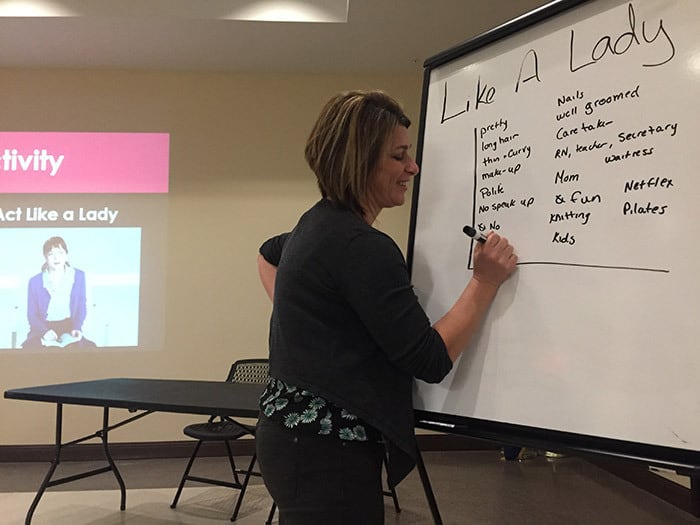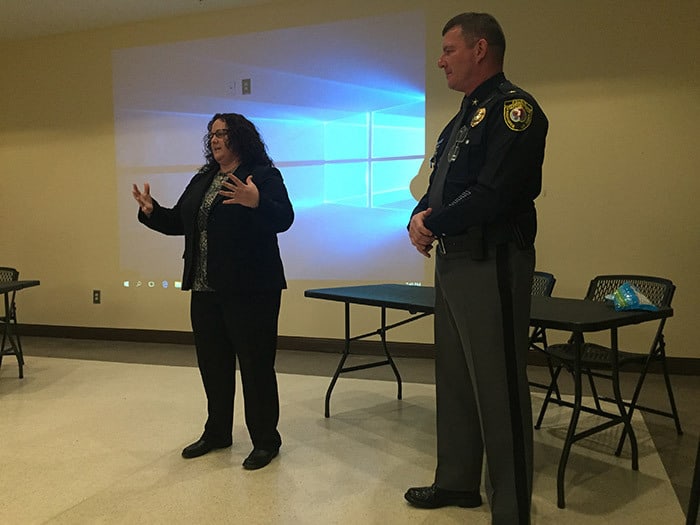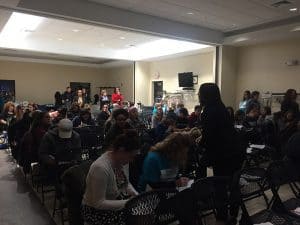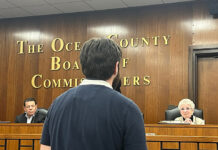STAFFORD – Local students and community members got some unique insight and educational tips during a seminar on the importance of recognizing and dealing with sexual violence, held recently at the Bay Avenue Community Center in Manahawkin.
“Breaking the Silence on Sexual Violence: Media Literacy and Sexual Violence Law,” was the title of the seminar led by members from the St. Francis Community Center Counseling Services. The seminar was broken up into three parts, beginning with an introductory presentation about gender roles and sexual violence definitions by Meghan McAleer, LSW, the Sexual Abuse and Assault Prevention Program Coordinator at St. Francis.
McAleer began by defining the concept of media literacy. “It is how we understand, or how we interpret the information we’re getting,” from any kind of media source, she said.

The concept of media literacy was a large part of the seminar, because as McAleer noted, we need to critically examine the things we interpret daily from the media in order to be media literate about things such as gender and sexuality.
She discussed topics such as gender versus sex, hyper masculinity, and what it means to “be a man” versus “act like a lady.” Showing funny commercial advertisements and videos to the audience, McAleer engaged with them by throwing candy out to individuals who shouted out correct answers, getting the conversation about sexual violence started in a comfortable atmosphere.
“If you’re laughing, you’re learning,” she joked. Sexual violence is a sensitive topic for many, and McAleer made it very easy for individuals to start a productive discussion around the topic.
She helped the audience to describe what we all consider to be stereotypical characteristics of men and women. The transition into a discussion about sexual violence came when she asked the audience: “What happens when a man or women acts outside of the stereotypes?”
Jumping from the lighter topics to the statistics, McAleer noted that 1 in every 2 women and 1 in every 5 men has had an experience with sexual violence in their lifetimes. These numbers are bit unsettling, especially when you notice the stark gap between males and female.
McAleer did a great job in drawing the audience’s attention to everyday things that contribute to our distorted view of sexual violence; for example, certain movies and television shows that implicitly normalize sexually violent culture, like Beauty and The Beast, among others.
“I love Game of Thrones, but what do they always do on that show?” McAleer said, “They fight and rape women.”
Following her presentation was Donna Velardi, RN, FN-CSA, the SART/FNE Coordinator from the Ocean County Prosecutor’s Office.
Velardi is a member of the SART for Ocean County, which stands for the Sexual Assault Response Team.
“New Jersey is special because all 21 counties participate in the SART program,” she said.
The SART team is made up of law enforcement agents, a Confidential Sexual Violence Advocate, and a Forensic Nurse Examiner. Additional members that can play a part in the process are prosecutors and hospital staff members.
When talking about sexual violence, Velardi said, “It’s really about power and control.” When Velardi helps a patient, or a victim of sexual abuse, she noted that the victim is always in charge.
“They get to tell me how they want to do things,” she said.
According to her presentation, SART exists to provide victim-centered services, to help minimize re-victimization, to provide forensic medical exams quickly and with quality evidence examination, and to assist in prosecution. The SART program is required by law and is coordinated by the NJ Division of Criminal Justice and operated by the County Prosecutor.
The Ocean County SART program works with four different hospitals in Ocean County, including: Ocean Medical Center in Brick, Monmouth Medical Center Southern Campus in Lakewood, Southern Ocean Medical Center in Manahawkin, and Community Medical Center in Toms River. Velardi said that if a victim of sexual assault visits one of these hospitals for help, they need not wait in the emergency room. These patients are taken back to a specially designated room for SART that allows them easy and quick access to advocates that will help them.

“I have been a Forensic Nurse for 18 years,” said Velardi. “I’ve done over 200 cases of sexual assault in my lifetime.”
She also noted that the SART program and all of the services and resources it provides its patients are all grant funded and free to patients, excluding sexually transmitted disease (STD) testing.
Velardi ended her presentation on a positive note, noting that more males have been recorded coming forward after incidents of sexual abuse.
“This means that these men are becoming better educated, and stronger,” when it comes to sexual violence, she said.
Following Velardi was the final aspect of the seminar, which included comments from Stockton University Interim Police Chief Cynthia Parker and Stafford Township Police Chief Thomas Dellane.
“Sexual violence (response) is not something that the law enforcement department does by themselves,” Chief Parker said.

Accompanying Parker at the seminar were officials from Stockton, including the Clery Compliance Coordinator Rosanne Latoracca, Title IX Coordinator Valerie Hayes, and Director of the Women’s Gender and Sexuality Center Laurie Dutton.
“The more we educate, it’s all about prevention, but the big thing is consent,” Hayes emphasized.
Chief Dellane noted that the department has a very strong focus on providing the needed services to the community, regarding sexual assault. “Our purpose, our goal, is to prevent re-victimization,” he said.
Velardi mentioned that, “we would like everyone to come forward (for help)…but not everyone is ready.”
To this, an audience member said: “The important takeaway is to tell someone.”






